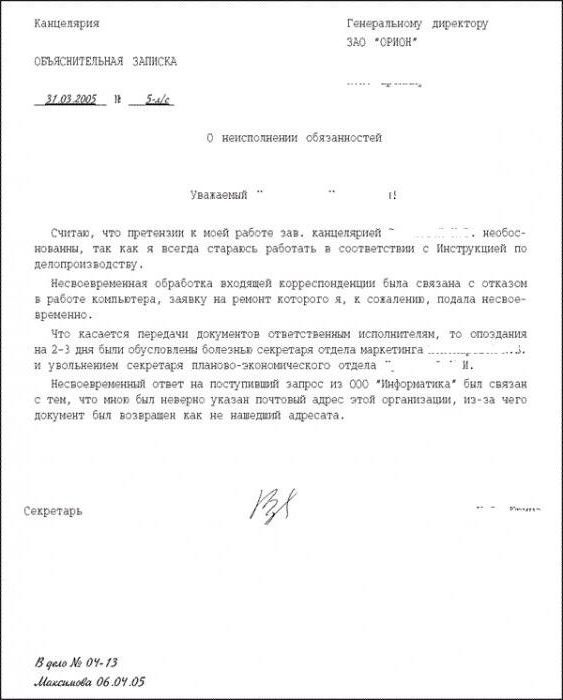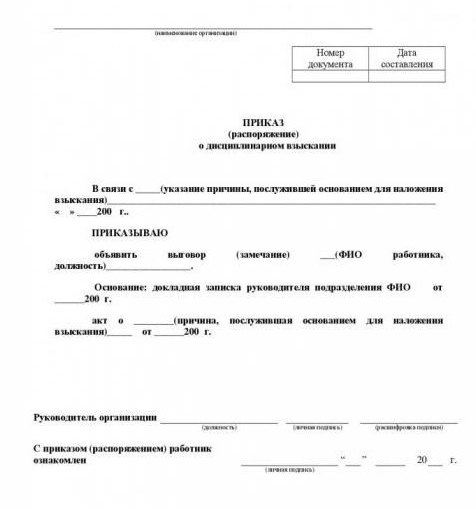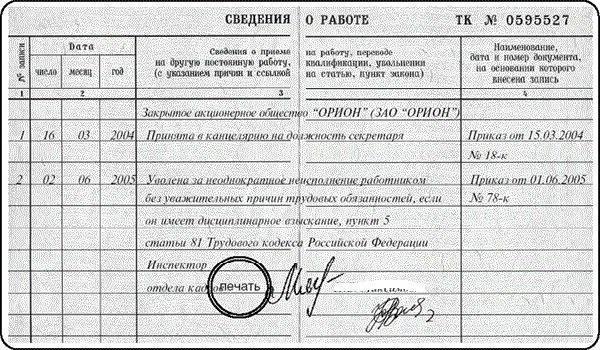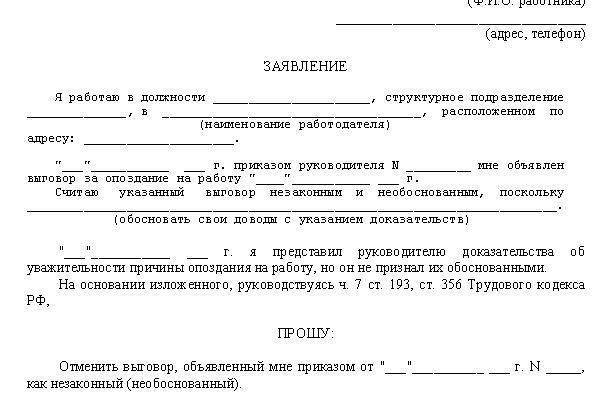Often, leaders are faced with unprincipled performance of labor duties by their subordinates, as well as with their violation of labor discipline. Penalties may be imposed for offenses committed by employees. Disciplinary action shall be applied no later than one month from the date of the misconduct.
Definition
The term “disciplinary sanction” implies a certain type of punishment applicable to an employee who does not fulfill his labor duties specified in the employment contract. Article 192 of the Labor Code of the Russian Federation regulates the types of penalties. In addition, those penalties that are provided for by federal law or the company's charter may be applied.

It should be said that the penalty should be related to the severity of the act. But in most cases, disciplinary punishments are purely subjective. Let us consider in more detail all the nuances of penalties and whether it is possible to appeal a disciplinary sanction.
Kinds
Given the provisions of the labor code, a penalty may be applied against an employee according to his misconduct. Disciplinary sanctions include:
- making comments;
- reprimand;
- termination of the employment contract.

Also, the head of the organization can relieve the employee of his post or warn about the fact of non-compliance with the position. The listed types of punishment are provided by the labor code. Disciplinary sanctions in the form of deprivation or reduction of wages are illegal. An exception is considered if these nuances are indicated in the company's charter or other regulatory documents.
Application
As mentioned earlier, the types of disciplinary sanctions and the procedure for imposing them are regulated in legislative acts. Quite often there are situations when employees do not fulfill their obligations, and employers punish the wrong employees. When will disciplinary action be lawful and reasonable?
According to the legislation (article 192 of the Labor Code of the Russian Federation), those violations that are specified in the employment contract and are not executed properly are punished first. This may include:
- Implementation by the employee of actions that are not permitted by documented regulations or organization instructions.
- Violation of the job description or other rules of the organization.
- Non-observance of labor discipline.
The employer considers illegal punishments such as:
- Imposition of fines that are not documented.
- Salary reduction.
- Unreasonable punishments that are not documented.
- The imposition of illegal penalties for the manipulation of workers.
- Other punishments that do not comply with the labor code.
It is possible to bring to disciplinary responsibility not only an ordinary employee, but also the head of a department or structural unit. This right is governed by Article 195 and Part 6 of Article 370 of the Labor Code of the Russian Federation. The union has the right to monitor compliance with labor laws at the enterprise. If there is a fact of violation of the norms of legislation, local acts, concealment of accidents, failure to comply with the terms of the collective agreement, the trade union may require the higher management to punish the immediate culprit of the revealed violations.
Registration
Disciplinary sanction shall be applied no later than a month from the date of detection of misconduct. Any punishment must be drawn up accordingly. The order of registration is as follows:
- Documentation of the violation. This includes the preparation of an act, report or decision of the commission.
- An explanatory note from an employee. This document must be requested in writing for the signature of the employee. If he refuses to provide an explanatory note on the fact of violation, then an appropriate act should be drawn up within 2 days. With the explanatory provided, the employer considers it and makes a decision. If there are good reasons, the recovery may be canceled.
- Issuing an order. The document must indicate the decision of the head, which he personally takes. You need to be guided by the misconduct itself, the circumstances that led to its commission, the severity of the consequences, etc. After the order is issued, the employee must be familiarized with it within three days.

Order
The order reflecting the decision of the head of the violation must contain the following information:
- full details of the employee;
- place of work and position of employee;
- essence of violation and list of violated items;
- a description of the violation and a conclusion on the severity of the misconduct;
- type of recovery;
- grounds for punishment (all documents collected before the order is issued are attached).

The order must be made in form and not contradict the Labor Code. Disciplinary action must be consistent with misconduct. Otherwise, the order can be challenged. The refusal to familiarize oneself with the order must also be recorded in the act.
Labor records
A disciplinary sanction in the form of a reprimand or a comment is not entered in the work book, but at the request of the head it can be entered in the personal file of the employee.

But the dismissal under the article must be indicated in the labor as a basis for termination of the employment contract.
The timing
The terms by which the employer should be guided are clearly spelled out in the labor legislation.
Firstly, disciplinary sanction is applied no later than 30 days from the moment of detection of misconduct, not counting the temporary incapacity for work of the employee or annual leave. Secondly, it is forbidden to apply penalties after six months, since the statute of limitations of the offense itself expires.
But a logical question may arise - no later than when a disciplinary sanction is applied if an audit or audit has been carried out? Here, the statute of limitations is two years from the date of discovery of the misconduct.
If the head does not comply with the specified time limits and this fact was discovered by the employee of the labor inspectorate, the penalty may be appealed in court.
Appeal
Disciplinary sanctions include comments, reprimands and dismissals, as appropriate. Can such punishments be appealed? It is possible, if the employee is sure, then he was punished illegally and unfairly.
For this, a citizen must draw up an application and send it to one of three authorities: the labor inspectorate, the commission for the resolution of official disputes, and the court.

The term of appeal is 90 days from the moment when the employee received a notice of foreclosure. If the collection involves termination of the employment contract, then you can appeal it within a month.
Withdrawal
The duration of the disciplinary action is 12 months. In other words, if no illegal actions were recorded for the employee within a year after the violation was committed, the punishment is automatically canceled. And the employee after that is recognized as not committing misconduct.
In addition, within the prescribed period, the employer can independently cancel the collection at the request of the trade union, the employee himself or at the request of the immediate supervisor.
Effects
For an employee, the consequences of penalties may result in the following:
- Deprivation of premiums and other incentive payments. This clause is the case if the issue of deprivation is reflected in the local acts of the organization.
- By receiving a second disciplinary sanction, an employee may be dismissed in accordance with legislative provisions.
A responsibility
A disciplinary sanction is applied no later than one month from the moment of violation and it is necessary to approach the application of such punishment in all seriousness, especially when it comes to dismissal.
Termination of an employment contract with an employee at the request of the head is possible only after a second sentence with an existing penalty.
The employer must follow the algorithm of actions. It must be remembered that for the same misconduct can not be punished twice.
It is important to pay attention to documentation: internal local acts establishing labor relations and documents relating to different cases of disciplinary action.
Employee obligations must be assigned to the employee appropriately, and when new obligations appear, they must be formalized.

All documents relating to the employee: an employment contract, local regulations, job descriptions, work schedules, must be executed without errors and include the entire list of work. Each document must be signed and with each of them the employee must be acquainted with the signature.
If an error is found in any of the documents, this may create difficulties in imposing a disciplinary sanction.
Each document should be made in accordance with all the rules. If a paper on disciplinary action is drawn up, then evidence in the form of acts, memos, explanatory notes must be attached in support. Each of the attached evidence must be accompanied by signatures and the correct dates.
According to the standards, the duration of a disciplinary sanction is no more than a year, but everything will depend on the employee himself.
In addition, if the employee is confident in his innocence or he can prove the incorrectness of the documentation, you can contact the labor inspectorate. Employees of the labor inspectorate, in case of violations, as well as illegal actions by the company management, can bring the latter to administrative responsibility.
Also, disciplinary punishment that is unreasonable or applied with obvious violations of the law may be declared unlawful. And if the collection officer was dismissed, he will be required to reinstate and pay the appropriate compensation (for involuntary absenteeism, for moral damage, etc.). The head is also required to incur costs for litigation, verification of the labor inspectorate or prosecutor's office, the cost of a lawyer and possible penalties. And most importantly, if the fact of a violation on the part of the organization is revealed, then it simply may lose a good reputation and authority among other employees.
So, in order to avoid unnecessary problems during work, many employers need to take a more serious approach to the system of punishments and rewards. The punishment of employees should not be subjective, and the use of penalties should be in accordance with the law. All systems of fines and bonuses must be documented, then there will be no questions.